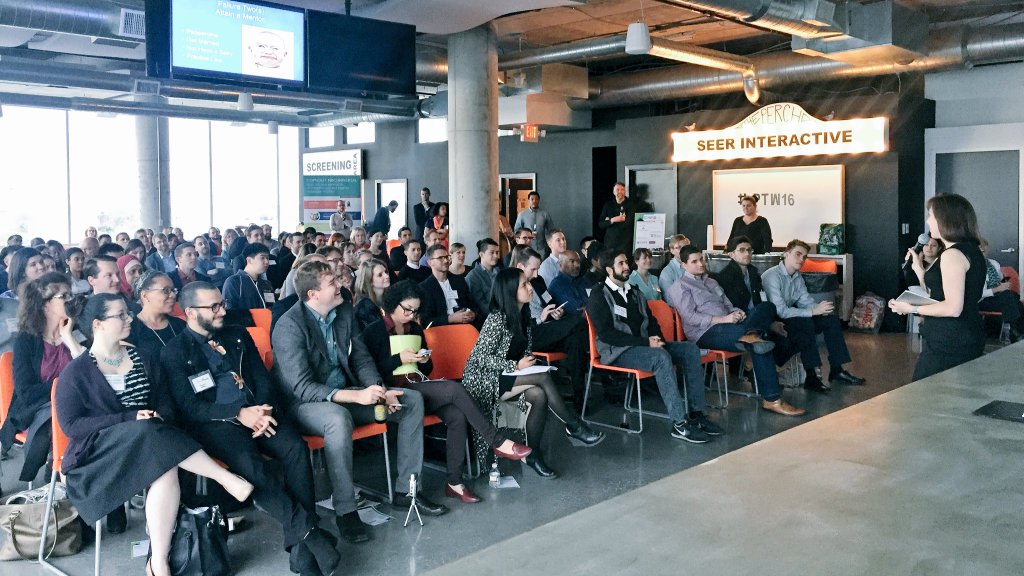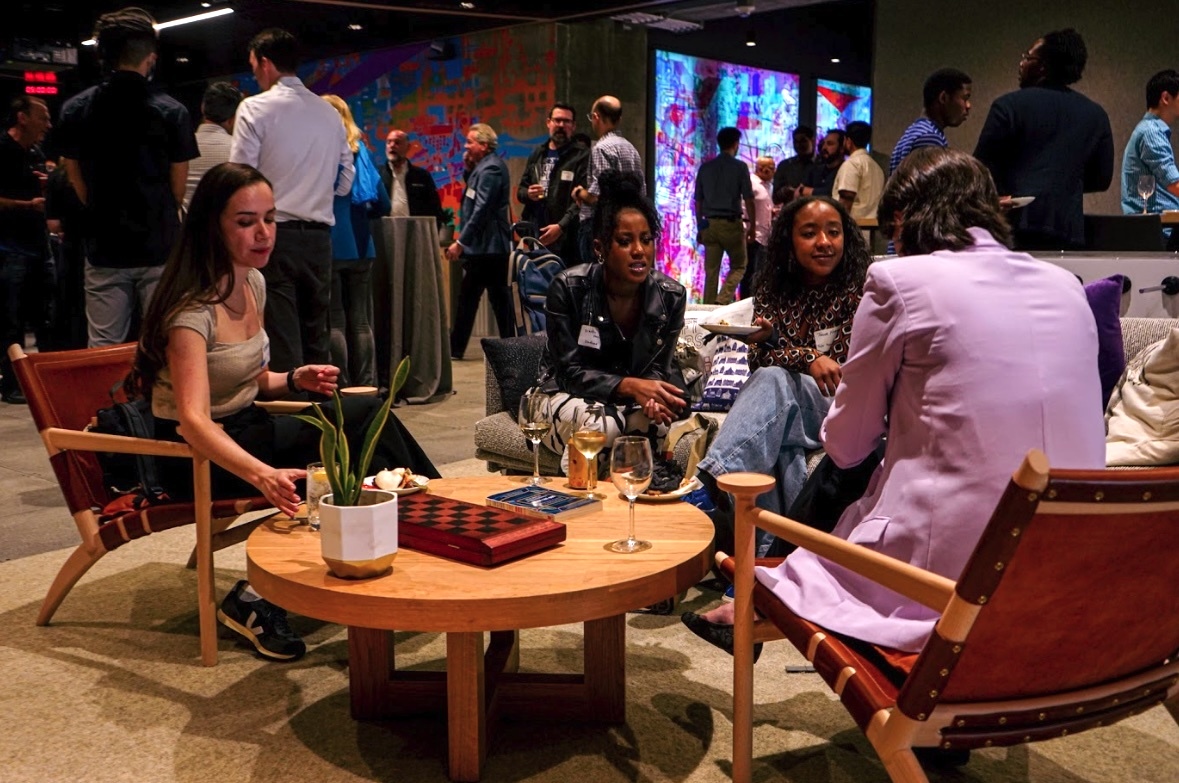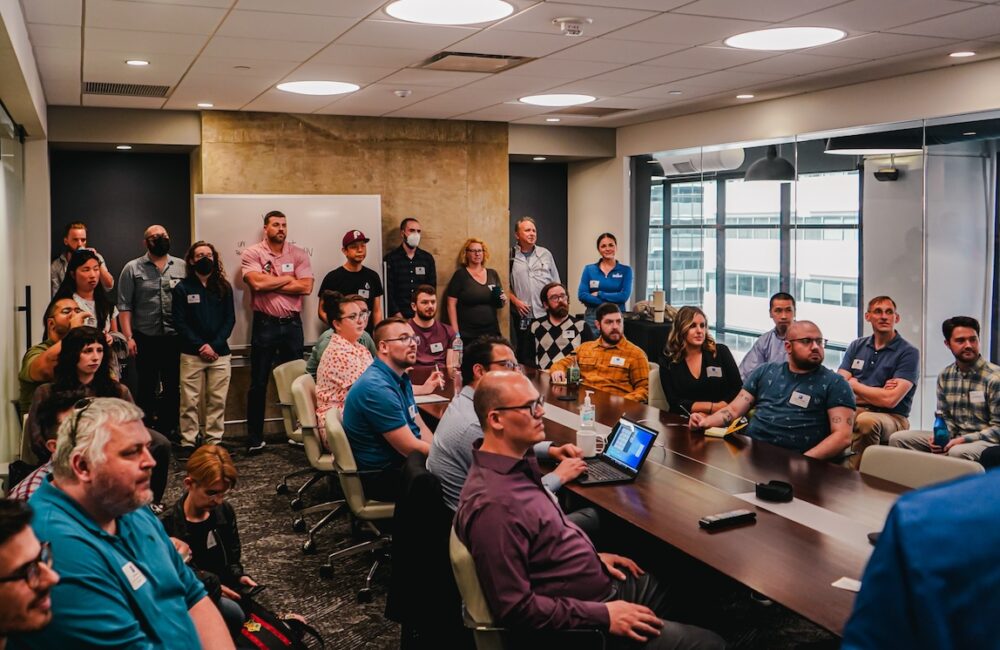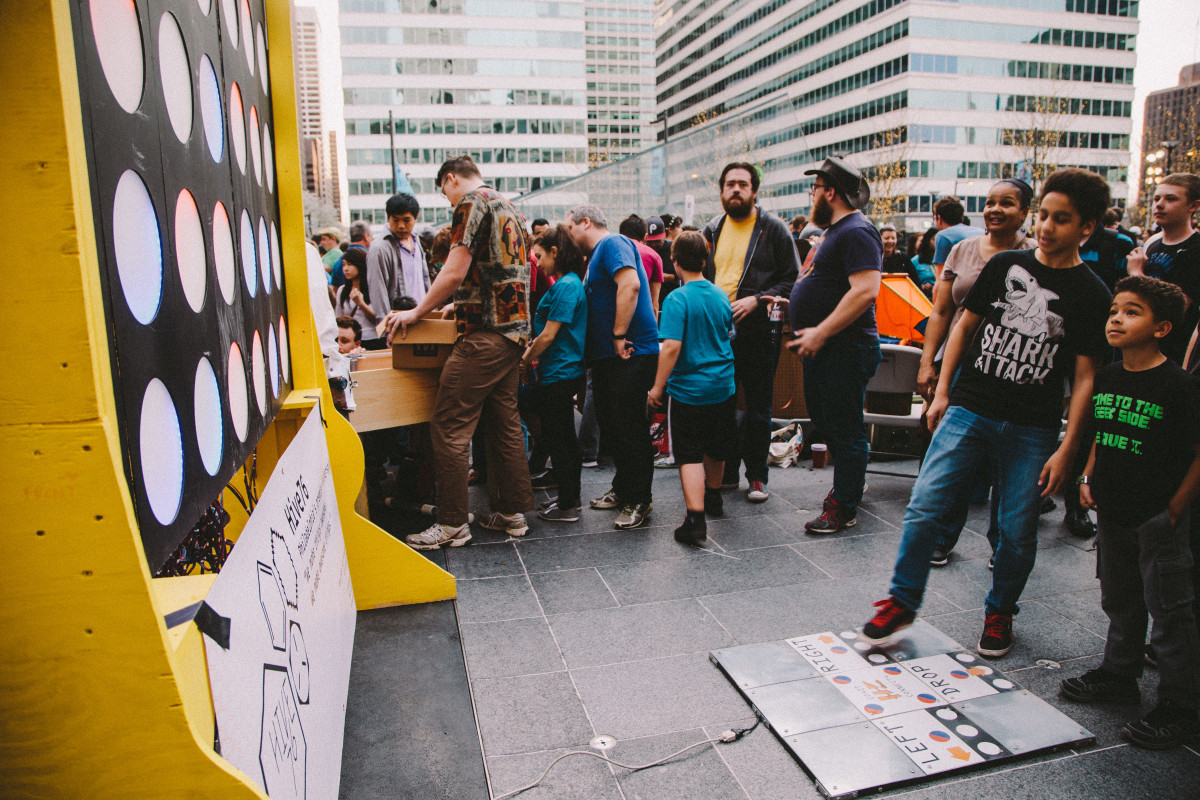That February, Chris Wink, Sean Blanda and Brian James Kirk launched a blog called Technical.ly Philly aiming to cover the growing technology ecosystem in Philadelphia.
Since then, Technical.ly has watched and reported as a community of technologists and entrepreneurs came together alongside growing companies and other tech-focused organizations. Our work started in Philadelphia, but over the years we’ve expanded to Baltimore, DC, Delaware and Pittsburgh, where fledgling tech communities have made their own mark.
Our local coverage over this decade and a half has included organizations that have been in the Philadelphia region for many years, such as Comcast and Ben Franklin Technology Partners, but also new companies and groups such as Amplify Philly and 1Philadelphia.
To recognize how far Philly tech has come, we asked members of the tech community to look back at what they were doing 15 years ago and what has changed since then, and to look forward another 15 years. Here’s what eight people had to say. These responses have been lightly edited for clarity or length.
What were you doing 15 years ago?
Michelle Freeman, CEO of Witty Gritty: I was starting my freelancing career (early days of what would become Witty Gritty). I was in Philadelphia wrapping up my tenure at Campus Philly and involved in Young Involved Philadelphia. I was primarily involved with civic tech around that time.
Eamon Gallagher, director of the Center for Law and Transformation Technology at Drexel University: In 2009 I was transitioning from my first career, as a technical recruiter working with companies in growth mode, and touring law schools to prepare for my next career. Ultimately, I decided to go to Drexel Law based on the strength of their Business & Entrepreneurship concentration, which has paid dividends repeatedly in building my career in the Philadelphia startup ecosystem, from the Drexel Entrepreneurial Law Clinic to Keiretsu Forum Mid-Atlantic to Ben Franklin Technology Partners, Seed Philly/Philly New Tech Meetup, etc.
Andrew Buss, deputy chief innovation officer at the Office of Innovation and Technology at the City of Philadelphia: Fifteen years ago I was working with a large group of cross-institutional stakeholders to help the City win an American Recovery and Reinvestment Act grant for public technology centers, later branded as Keyspots. It was an authentically collaborative process, and I still think one of the most creative things the public sector has done.
Sevile Mannickarottu, director of technological innovation and entrepreneurship at Penn Engineering: I managed Penn’s Bio-MakerSpace and was very involved with teaching people about tech.
Rick Nucci, CEO of Guru Technologies: This time 15 years ago I was the cofounder and CTO at Boomi, and it was 18 months before the company would be acquired by Dell. It was an exciting time. We were busy building our “integration platform as a service” offering which we had launched as a beta in late 2007.
Anne Gemmell, principal at A-Gemm Consulting: Fifteen years ago, I was a cofounder of Education Voters Pennsylvania. It was my first foray into a “startup” experience. I lived in Philadelphia but also spent time traveling to rural and suburban school districts across the Commonwealth. I noticed firsthand the digital divide and a wide divergence in how tech tools and tech curriculum were adopted by schools and families. I was also using technology as a tool to organize PTAs, home and school associations, and school boards to act collectively and influence education budgets in Harrisburg.
Alex Hillman, cofounder of Indy Hall: Indy Hall, the coworking community that I cofounded and have been running since 2006, was a few years old. We had outgrown our original space, which was the first coworking space in Philadelphia. We had a pretty substantial waiting list, if I remember right. And we were actively looking for potential options to relocate the Indy Hall community to a larger space. When I started Indy Hall, I was a freelance web developer. At this point, I was doing more business strategy with technology companies and teams.
Bret Perkins, SVP of external and government affairs at Comcast: I’ve lived in Philadelphia since graduating from Temple University and have been with Comcast since 2001. In that time, I have had a front row seat to Philadelphia’s evolution as a tech and innovation hub. Along with my Comcast colleagues, government and community leaders, I’ve also had the opportunity to contribute to our city’s tech policy and digital equity initiatives.

What has changed in Philly tech over the last 15 years?
Freeman: I have definitely seen a much stronger, thriving tech community over the years. From the early days of Philly Tech Week and the height of meetup groups, to now, where there are so many great startups and businesses laying their foundation here through accelerator programs, more investment dollars, and the support of the community. I remember the concept of online publications (like Technical.ly) and even online advertising being newer concepts then … and now, it’s a completely changed picture with all the different tools, platforms and social media in existence.
Gallagher: In 2009, the startup ecosystem was still suffering from its dot-com hangover. Multiple Philadelphia-area unicorns were recovering — Safeguard Scientifics, VerticalNet, Internet Capital Group — and moving from the suburbs, to younger entrepreneurs based downtown. Philly Startup Leaders was starting, groundwork was being laid for the first coworking spaces at Seed Philly, the Science Center and Drexel, and Indy Hall. Every year the ecosystem has gotten bigger and more vibrant and is as strong and public as it has ever been, but in many ways, it still lacks coherence, navigability and leadership.
Buss: Certainly the emergence of public technology and innovation portfolios in Philly’s municipal government is a big change. Like some other cities, Philadelphia really jumped into finding ways to offer impactful technology experiences for our residents, and that work continues today. Now public sector technology offices are expected to handle both the day to day operational technology responsibilities for our departments, while also driving public technology and innovation initiatives in areas like digital equity, smart cities, digital services and capacity-building.
Mannickarottu: We’ve developed a more vibrant startup scene, not just with biotech, but also in other areas, such as robotics, software, medical devices, etc.
Nucci: Philadelphia’s startup ecosystem has come a long way over the last 15 years. Nowadays it’s a lot easier to connect with other founders and startup leaders, and that goes a long way to creating a sense of community that’s so important for early-stage tech companies. At the same time, the ecosystem isn’t as noisy as what you might find in major tech hubs, which means it’s easier for promising companies to gain traction and attention. It’s a nice balance.
Progress hasn’t been linear, though. And the pandemic put a number of Philadelphia-based companies at a disadvantage, in the short-term at least. When the world went fully remote in 2020, a lot of local companies suddenly found themselves competing with tech giants in Silicon Valley for talent. But as the shift to hybrid work became more established, the city saw an influx of new tech workers attracted to life here, some of which were moving for the first time, and others who were returning home. This shift has widened the talent pool and injected fresh energy into the community.
Gemmell: Philly Tech is now much more interconnected and supportive of digital equity efforts. Digital equity is a continuum. It begins with high-speed internet access, progresses to high-quality K-12 tech education with ISTE standards, and onto higher ed or apprenticeship programs like the Urban Technology Project, founded in 2002. Yet more of Philly’s K-12 students still need more access to quality tech education.
On the bright side, none of the partnerships between employers and tech training orgs were in existence or as robust. Many quality orgs provide alternative paths directly into tech careers by cooperating with industries that need tech talent. Per Scholas, Tech Impact, Hopeworks, Resilient Coders — and other strong programs like Launchpad and Tech Girlz for younger people — are all here and working to build a stronger tech talent pipeline for the region.
Hillman: So much of that early tech community was about making things together. I think a lot of that sense of making things with other people, it’s all kind of been institutionalized. We’ve entered into an era that is less about building and more about maintaining. And I don’t think that’s necessarily worse. I think it’s a mark of maturity in some ways.
The things that changed in tech in part changed because of tech itself maturing and it needing less builders and more maintainers, and because tech became an economic opportunity just as much as it became a way for a creative person to express their skills and their interests and their perspective. But I don’t think that energy is gone in Philadelphia. If anything, I think it might be more powerful because when I think about the food and beverage scene and when I think about the music scene and the photo scene and the videographer scene, especially what I’ve seen, I see that same early energy that I remember very fondly from 2009. But it’s being expressed by Black and brown Philadelphians, minority Philadelphians, way more women.
Perkins: Philadelphia has evolved significantly. Thanks to organizations like Technical.ly, Philly Startup Leaders, 1Philadelphia, Amplify Philly, Philadelphia Alliance for Capital and Technologies (PACT) and others, there is a uniquely Philadelphia tech culture today that didn’t exist 15 years ago. Philly is also a leader in digital equity partnerships — we’ve built a community around these partnerships, and we have organizations that have been working toward digital equity for a long time.

Where do you hope or expect to see Philly tech in another 15 years?
Freeman: I hope we can really step up as a leader in the AI space — using it for good, being the national standard from an ethical standpoint. I also hope we attract more mid- to large-sized companies to anchor here to help further build out our talent pool and effectively support the new and smaller entrepreneurial network.
Gallagher: My hope is that in 15 years, the startup ecosystem and Philadelphia will have continued to grow in size, scale and success in many ways. 10k Independents is thriving, allowing individuals to start their own businesses more quickly and successfully.
Central, inclusive space [will help] organize and highlight the great things going on in the Philadelphia region and [make] Philadelphia more navigable for both local startups and external resources and capital.
Local universities and support organizations [will] all be located in the same centrally located/public transit-adjacent/accessible location to ensure equitable access to resources, investment, and talent to help drive the city forward by activating more of our population and allow them to build a better, more inclusive, more successful future for the City.
Buss: I would like to think that digital inclusion and equity will pose less of a challenge 15 years from now because we have successfully solved some of the challenges. I see public sector technology offices really diving into accessibility considerations for websites and applications by focusing on good design that everyone can use and plain language content that everyone can understand.
Mannickarottu: I’d love to see the startup world get bigger — the area engineering schools should partner to train and retain incredible technical talent, both as engineers, but also as leaders to help run these companies. Our universities should spin out their ideas to form companies. When people think of startups in America, they should think of Philadelphia. We are affordable, fun and high tech.
Nucci: I’d love to see more founders choose Philadelphia as a place to start their company. And I think a way to encourage that is by bringing more awareness of Philadelphia’s success stories — we have a lot of them!
When startups get spotlighted by local Philadelphia media and organizations, it can propel them onto a bigger stage. For example, when Guru was featured in [Revolution’s] “Rise of the Rest” campaign, that helped us to gain national coverage and grew our brand awareness. Between the growing tech community and the highly skilled talent pool, the city has a lot to offer to entrepreneurs who are looking to build.
Gemmell: My hope is that 15 years from now, we look back and credit the Parker administration for two things.
One, [we] seized the unique opportunity to truly leverage the power of our remarkable STEM industries. Biotech, medtech, and other adjacent industries fuel our regional economy. The City has built a stronger and more cogent tech talent pipeline to both meet the demands of these growing industries AND enhance economic opportunity for thousands of historically disadvantaged people.
Two, [we] supported more business starts here and encouraged more people to start their own business — especially women and people of color. Our independent businesses even created new business models. Philadelphians recognize how we are a magnetic people who can learn, create and build like never before in history, thanks to technology. We can also access global markets more readily than ever before. It all started with bold collective vision, smart policy and readily available tech education for all. In 2039, Philadelphia successfully realized the positive potential of automation and AI to improve lives and thrive as a city and region.
Hillman: I’d like to see a more ethical and equitable Philly tech community in 15 years — hopefully much sooner than that.
I hope that Philly tech finally understands who it is. I don’t feel like there’s really an identity for Philly tech. I think people in Philly do tech. But I feel like if you were to ask the average Philadelphia tech person what Philly tech is, they’d say something like, “Well, the community is really great.” Or they complain about the lack of good tech jobs. Or startups would complain about the lack of tech funding. But I think that I just don’t hear enough people talking about what is the distinctly Philadelphia flavor of tech.
Perkins: I think we have a real opportunity to build an intentionally inclusive tech culture here in Philadelphia. The National Skills Coalition and the Federal Reserve Bank in Atlanta released a recent report finding that “92% of jobs require some level of digital skills, and nearly one-third of US workers do not have foundational digital skills.” We have so many nonprofit and community partners, and we have made great progress, but I expect to see even more partnerships and programs so we can prepare more Philadelphians for our tech-first 21st century workforce.
By investing in, and partnering with, trusted community leaders nationwide, I hope we will break down barriers to economic mobility and empower people with the skills and resources they need to succeed.








